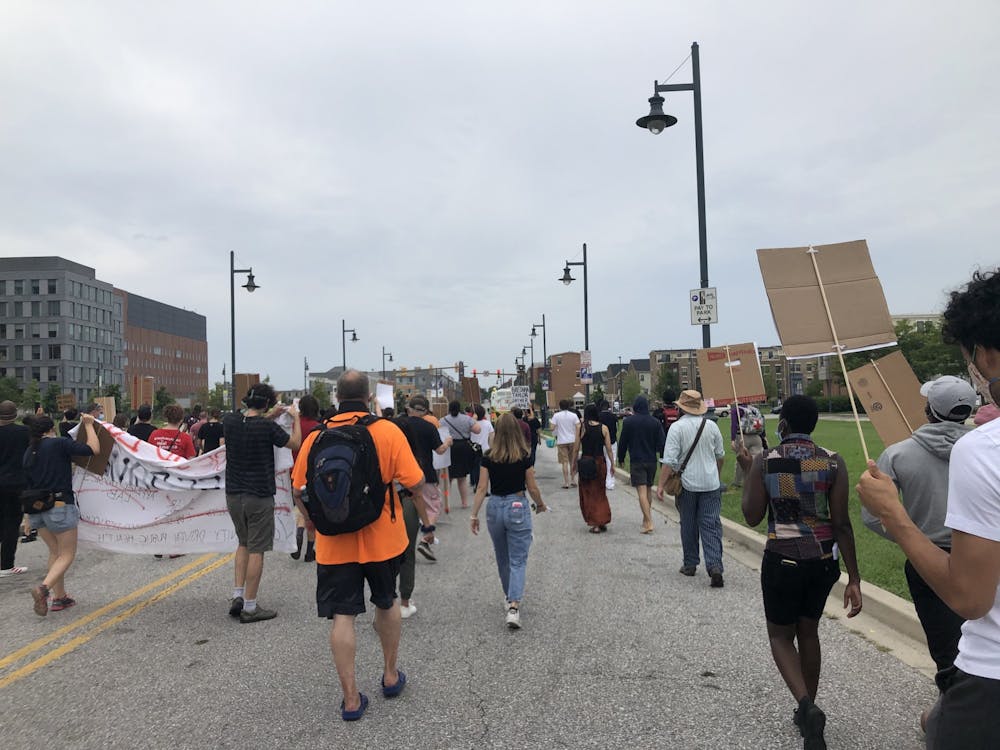The Coalition Against Policing by Hopkins (CAPH), consisting of about a dozen student and community groups, marched in East Baltimore on August 15 to demand the termination of the University’s plans to implement a private police force.
Speakers criticized the University’s historical mistreatment of surrounding communities of color — from the harvesting of Henrietta Lacks’ cancer cells to the East Baltimore Development Initiative, which displaced over 700 families near the medical campus.
CAPH member Mihir Chaudhary, who graduated from the Bloomberg School of Public Health in May, argued in an interview with The News-Letter that the Johns Hopkins Police Department (JHPD) would exacerbate racial inequity in Baltimore.
“The police is the crown of this process of gentrification. It does not exist in isolation,” he said. “It exists as a multipronged approach of racialized exclusion that Hopkins has been engaging in for years.”
Karen Lancaster, assistant vice president of external relations for the Office of Communications, responded to criticism of the JHPD in an email to The News-Letter.
“We decided to pause the implementation of a JHPD for at least the next two years given the need for us to come together as a community during this time of reimagining public safety,” she wrote. “We plan to spend the next two years exploring more deeply and continuing to invest in alternative approaches to preventing or interrupting criminal violence so that we reduce to the greatest extent possible our reliance on sworn policing.”
At the event, Brig Dumais, an organizer for 1199SEIU United Healthcare Workers East, the country’s largest health-care union, urged the University to invest in its essential workers, who they believe need more personal protective equipment (PPE).
“We want Johns Hopkins to get their priorities straight,” they said. “Instead of wasting millions of dollars on a dangerous police force that will not help to address the root causes of crime, we call on them today for more PPE, hazard pay and $15 an hour minimum wage at least.”
Rajani Gudlavalleti, community organizing manager for the Baltimore Harm Reduction Coalition, related the JHPD to the War on Drugs. Started in the 1970s, the War on Drugs is a federal campaign to reduce the use of illicit drugs, which a former Nixon aide admitted was intended to target Black people.
Since the civil rights movement, community organizer Duane Davis noted, politicians have appealed to white voters’ racism as an electoral strategy.
“Not once have you heard a politician... say, ‘End the War on Drugs.’ White people don’t use drugs? Y’all don’t smoke weed? Y’all don’t fuck with crystal meth? Y’all don’t got vices?” Davis said. “But y’all not from the prisons. I am.”
According to Gudlavalleti, the JHPD would heighten the racial disparities in the criminal justice system that the War on Drugs created.
“[Hopkins] says, ‘Oh, yes, addiction is a disease, and we need to be at the head of it. We need to run all of these... task forces to end overdose.’ If they actually cared about the lives of people who use drugs, people who have been targeted by drug policies for decades, they would not pass police,” she said. “They call themselves a health-care institution. They don’t give a shit about health. They didn’t give a shit about dignity or justice.”
Similarly, Chaudhary stressed that Hopkins Hospital has used hardball tactics to sue thousands of its Black and low-income neighbors in East Baltimore — for a median amount of $1,089 in alleged medical debt, according to a report published in May 2019.
Teachers and Researchers United, an unofficial graduate student union and part of CAPH, recently began circulating a petition demanding the end to this practice.
In an interview with The News-Letter, Gudlavalleti expressed her hope for Hopkins students to acknowledge how the institution has harmed Baltimore.
“We want to empower folks to do work from the inside and recognize what that could look like in the classroom — talking about social determinants of health and concepts about what is healthy and to critique that and what it means and where racism and poverty play into this stuff,” she said.
Organizers read a statement from Maryland State Senator Mary Washington, who emphasized that, amid nationwide protests against police brutality and racial injustice, the University must find sustainable solutions to crime in Baltimore.
“As a powerful renowned public health institution in Baltimore, I believe Johns Hopkins has a serious moral obligation to be a leader in putting the community first and actively working to reverse the harmful systems that were built upon and continue to uphold structural racism in our city,” the statement read.
In response to CAPH’s protest against the JHPD on June 29, Lancaster mentioned to The News-Letter that Hopkins helped bring Roca, a youth anti-violence program, to the city and provides faculty guidance to Safe Streets Baltimore, a public health and safety campaign to reduce shootings.
At the time, over 6,000 students, faculty, alumni and community members had signed a petition calling on the University to cancel the JHPD altogether.
To that end, Chaudhary stated that CAPH plans to identify and press key stakeholders.
Tawanda Jones, founder of the group West Wednesdays, told demonstrators over the phone to remain committed to their goals. Last spring, Jones held rallies with the Garland Sit-In and Occupation, a group of students and community members, who occupied Garland Hall for 35 days in protest of the JHPD.
Jones’ brother Tyrone West died in the custody of Baltimore Police and Morgan State University officers on July 18, 2013. She has led a vigil demanding justice for his death every Wednesday since.
“We’re going to keep on fighting to the end of the day,” Jones said. “We will win. We just got to keep the pressure up and our foot down.”





